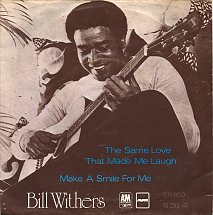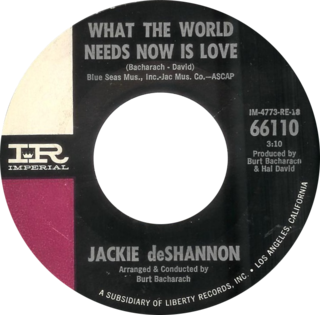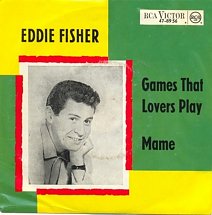
"I Can't Get Next to You" is a 1969 number-one single recorded by The Temptations and written by Norman Whitfield and Barrett Strong for the Gordy (Motown) label. The song was a number-one single on the Billboard Top Pop Singles chart for two weeks in 1969, from October 18 to October 25, replacing "Sugar, Sugar" by The Archies and replaced by "Suspicious Minds" by Elvis Presley. The single was also a number-one hit on the Billboard Top R&B Singles for five weeks, from October 4 to November 1, replacing "Oh, What a Night" by The Dells, and replaced by another Motown song, "Baby I'm For Real" by The Originals.
"Temptation" is a popular song published in 1933, with music written by Nacio Herb Brown and lyrics by Arthur Freed.
"To Each His Own" is a popular song with music written by Jay Livingston and lyrics by Ray Evans. It is the title song of the movie of the same name and was published in 1946 by Paramount Music. They were assigned to write this song after film composer Victor Young turned it down.
"Too Young" is a popular song. The music was written by Sidney Lippman, the lyrics by Sylvia Dee. The song was published in 1951.

"To Sir with Love" is the theme from James Clavell's 1967 film To Sir, with Love. The song was performed by British singer and actress Lulu, and written by Don Black and Mark London. Mickie Most produced the record, with Mike Leander arranging and conducting. The song peaked at the top of the Billboard Hot 100, and became the best-selling single of 1967 in the United States.
"Young Love" is a popular song, written by Ric Cartey and Carole Joyner, and published in 1956. The original version was recorded by Ric Cartey with the Jiva-Tones on November 24, 1956. It was released in 1956 by Stars Records as catalog number 539 and one month later by RCA Records as catalog number 47-6751. Cartey's version never charted.

"The Same Love That Made Me Laugh" is a song, composed and originally recorded by Bill Withers, which was included on his 1974 album +'Justments. Released as a single, it reached No. 50 on the U.S. Billboard Hot 100 chart and No. 10 R&B. The song reached the Top 40 in Canada.

"Still" is a 1979 song by the soul music group the Commodores. It was released as a single on Motown Records with "Such a Woman" as the B-side. The song appears on their 1979 hit album Midnight Magic. It is notable for being their last No. 1 before Lionel Richie went solo.

"C'mon Marianne" is a song composed by L. Russell Brown and Raymond Bloodworth and popularized by The Four Seasons in 1967. Produced by Bob Crewe, the single was the last Four Seasons single to reach the Top Ten of the Billboard Hot 100 chart in the 1960s, and their last Top Ten hit until "Who Loves You" in 1975.

"What the World Needs Now Is Love" is a 1965 popular song with lyrics by Hal David and music composed by Burt Bacharach. First recorded and made popular by Jackie DeShannon, it was released on April 15, 1965, on the Imperial label after a release on sister label Liberty records the previous month was canceled. It peaked at number seven on the US Hot 100 in July of that year. In Canada, the song reached number one.

"Love Ballad" is a song by R&B/Funk band L.T.D.. Jeffrey Osborne is the lead singer.

"Love or Let Me Be Lonely" is a pop song recorded by the soul group The Friends of Distinction and released as a single in early 1970. The song was a multi-format success, peaking in the top 10 of the Billboard Hot 100 at #6 on May 1, 1970 and at #13 on the R&B chart. On the Adult Contemporary singles charts, "Love or Let Me Lonely" went to #9. The song is ranked as the 63rd biggest hit of 1970.
"A Lover's Question" is a 1958 Pop, R&B hit for Clyde McPhatter. The single was written by Brook Benton and Jimmy T. Williams and was Clyde McPhatter's most successful Pop and R&B release. The bass singer is Noah Hopkins. "A Lover's Question" made it to #6 on the Billboard Hot 100 and was #1 for one week on the R&B chart.

"She's Trouble", also known as "Trouble", is a song by Michael Jackson, recorded in 1981 and originally written for his Thriller LP. However, Jackson's original version was an outtake and therefore never released, either as a single or an album cut.

"I Guess the Lord Must Be in New York City" is a song written and recorded by singer-songwriter Nilsson in 1969. A track from his fourth studio album, Harry, it became his second charting single.

"I Live for Your Love" is a 1987 song by Natalie Cole. It was the second of four charting singles from her Everlasting LP, and was also the second greatest hit from the album.

"History Repeats Itself" is a 1966 narrated song written and recorded by Buddy Starcher. It became his greatest hit, reaching number 39 on the U.S. Billboard Hot 100 and number two on the Country singles chart.

"Soul Deep" is a song by The Box Tops. It was the third of three singles released from their 1969 Dimensions LP. Lead vocals were provided by Alex Chilton.

"Games That Lovers Play" is a popular song composed by James Last which became a hit for multiple artists in 1966 and 1967. The song has been recorded more than 100 times.
"No Love at All" is a song written by Johnny Christopher and Wayne C. Thompson. It was recorded by American country music artist Lynn Anderson and released as a single in June 1970 via Columbia Records.














